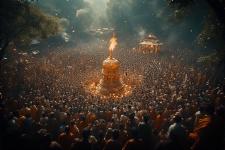Bengal
The Bengali Paradox | From Hindu Renaissance to Communist Hegemony
Posted on 7 mins
TLDR - Executive Summary: Bengal’s transformation from the epicenter of Hindu nationalist awakening to communist stronghold represents a catastrophic constitutional paradox of civilizational proportions. The very region that produced Bankim Chandra Chatterjee’s Vande Mataram, Aurobindo Ghosh’s revolutionary spirituality, and the Jugantar secret societies—intellectual architects of Hindu constitutional thought—ultimately embraced an ideology fundamentally antithetical to its civilizational foundations. Key Timeline of Events: The Golden Epoch (1838-1920): Bengali intellectuals created sophisticated frameworks fusing Vedantic philosophy with militant nationalism; Chatterjee sanctified motherland-devotion as constitutional principle; Aurobindo transformed spiritual disciplines into revolutionary methodology; secret organizations operated as parallel governmental structures rooted in dharmic principles.